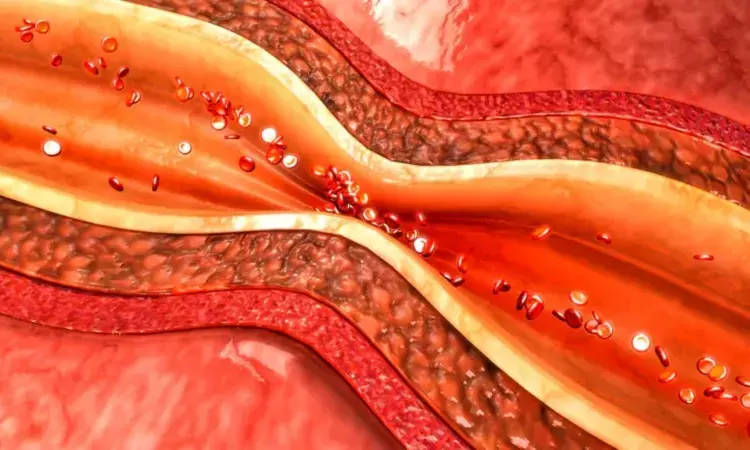- Home
- Medical news & Guidelines
- Anesthesiology
- Cardiology and CTVS
- Critical Care
- Dentistry
- Dermatology
- Diabetes and Endocrinology
- ENT
- Gastroenterology
- Medicine
- Nephrology
- Neurology
- Obstretics-Gynaecology
- Oncology
- Ophthalmology
- Orthopaedics
- Pediatrics-Neonatology
- Psychiatry
- Pulmonology
- Radiology
- Surgery
- Urology
- Laboratory Medicine
- Diet
- Nursing
- Paramedical
- Physiotherapy
- Health news
- Fact Check
- Bone Health Fact Check
- Brain Health Fact Check
- Cancer Related Fact Check
- Child Care Fact Check
- Dental and oral health fact check
- Diabetes and metabolic health fact check
- Diet and Nutrition Fact Check
- Eye and ENT Care Fact Check
- Fitness fact check
- Gut health fact check
- Heart health fact check
- Kidney health fact check
- Medical education fact check
- Men's health fact check
- Respiratory fact check
- Skin and hair care fact check
- Vaccine and Immunization fact check
- Women's health fact check
- AYUSH
- State News
- Andaman and Nicobar Islands
- Andhra Pradesh
- Arunachal Pradesh
- Assam
- Bihar
- Chandigarh
- Chattisgarh
- Dadra and Nagar Haveli
- Daman and Diu
- Delhi
- Goa
- Gujarat
- Haryana
- Himachal Pradesh
- Jammu & Kashmir
- Jharkhand
- Karnataka
- Kerala
- Ladakh
- Lakshadweep
- Madhya Pradesh
- Maharashtra
- Manipur
- Meghalaya
- Mizoram
- Nagaland
- Odisha
- Puducherry
- Punjab
- Rajasthan
- Sikkim
- Tamil Nadu
- Telangana
- Tripura
- Uttar Pradesh
- Uttrakhand
- West Bengal
- Medical Education
- Industry
What is role of acetylcholine rechallenge in treatment of coronary artery spasm patients?

Germany: Results from a recent study in the journal JACC: Cardiovascular Interventions show the presence of concurrent microvascular spasms in many patients with epicardial spasms. Intracoronary nitroglycerine seemed to be helpful in preventing most epicardial spasm but not microvascular spasm on repeat acetylcholine (ACh) testing.
The coexistence of epicardial and microvascular spasm is hard to identify, and thus its frequency is not known. Despite contradictory data, nitroglycerin treatment is recommended equally for both epicardial and microvascular coronary spasms despite contradictory data. Andreas Seitz, Department of Cardiology and Angiology, Robert-Bosch-Krankenhaus, Stuttgart, Germany, and colleagues, therefore, aimed to assess the feasibility and clinical value of ACh rechallenge for the detection of coexisting epicardial and microvascular spasm and to determine nitroglycerin efficacy in these spasm endotypes in a multicenter study.
The study included 95 patients with coronary spasms to undergo ACh rechallenge, which consisted of repeated ACh provocation 3 minutes after intracoronary nitroglycerin administration using the same dose that previously induced spasm. In total, 95 patients (age 61 ± 12 years, 69% female) were included.
Following were the study's salient findings:
- Fifty-five patients (58%) had microvascular spasms, and 40 patients (42%) had epicardial spasms during initial ACh provocation.
- In 48% of patients with epicardial spasm, ACh rechallenge revealed coexisting nitroglycerin-persistent microvascular spasm.
- Nitroglycerin administration before ACh rechallenge prevented reinducibility of epicardial spasm in all patients with focal spasm and in 80% of patients with diffuse spasm.
- Microvascular spasm was prevented in only 20% by prior nitroglycerin administration but was attenuated in another 49% of patients.
"The study shows a high frequency of epicardial spasm with coexisting nitroglycerin-persistent microvascular spasm," wrote the authors. Intracoronary nitroglycerin was very effective for preventing reinducibility of epicardial spasm, whereas it prevented microvascular spasm in only 20% of patients."
"ACh rechallenge is a novel method that eases the detection of coexisting spasm endotypes and may pave the way towards the tailored treatment of vasospastic angina."
Reference:
The study titled, "Acetylcholine Rechallenge: A First Step Toward Tailored Treatment in Patients With Coronary Artery Spasm," was published in the journal JACC: Cardiovascular Interventions.
Dr Kamal Kant Kohli-MBBS, DTCD- a chest specialist with more than 30 years of practice and a flair for writing clinical articles, Dr Kamal Kant Kohli joined Medical Dialogues as a Chief Editor of Medical News. Besides writing articles, as an editor, he proofreads and verifies all the medical content published on Medical Dialogues including those coming from journals, studies,medical conferences,guidelines etc. Email: drkohli@medicaldialogues.in. Contact no. 011-43720751


